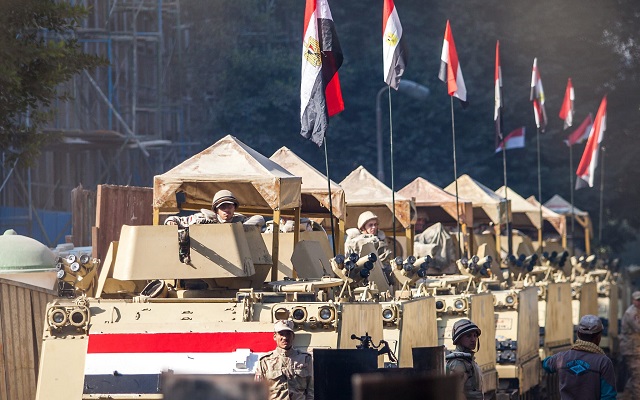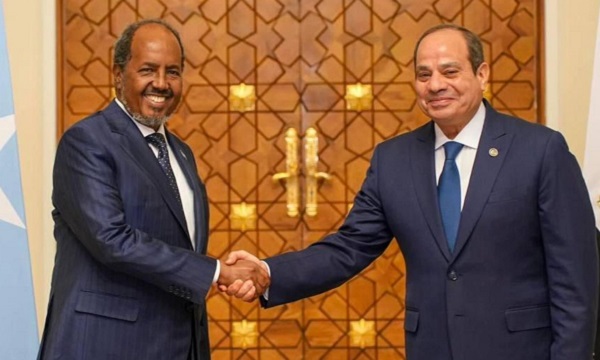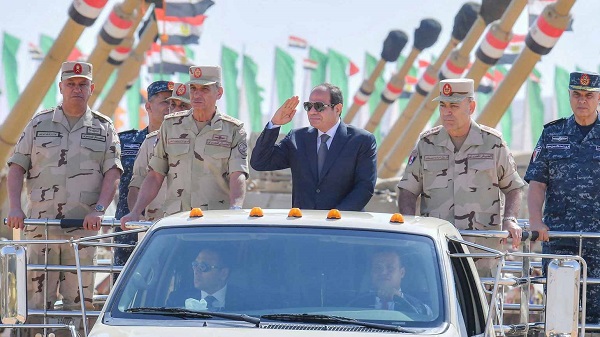
AU position unclear as Egypt courts Somalia against Ethiopia
COVER STORY | AGENCIES | The change in the African Union (AU) peacekeeping mission in Somalia at the end of 2024 is a potential trigger that could transform the rising political tensions into an armed conflict between Egypt and Somalia against Ethiopia.
That’s according to the latest report by the Institute for the Study of War (ISW), an independent America military affairs research organisation head by retired U.S. Army Gen. Jack Keane. The ISW reports several military and political developments to explain its conclusion.
The first development was Egypt’s deployment of 1000 soldiers into war-torn Somalia. They Egyptians arrived between Aug.27 and 29.
But on Aug. 28, the Ethiopian foreign affairs ministry released a statement implicitly warning Egypt and the international community against Egyptian military involvement in Somalia.
The Ethiopian statement repeatedly accused external actors—presumably Egypt—of destabilising the region and said that it “must shoulder the grave ramifications” of doing so.
Ethiopia framed these concerns as potential threats to its national security and actions that it “cannot tolerate.”
Multiple local reporters have since reported that Ethiopia began building up its military forces in the Ogaden region, which borders Somalia, in August.
Meanwhile, on Sept. 01 Egypt wrote to the UN Security Council warning that Ethiopia’s unilateral policy on the Grand Ethiopian Renaissance Dam (GERD) “threatens the stability of the region” and that Egypt is “prepared to take all measures and steps guaranteed under the UN Charter” to defend itself after Ethiopia began the fifth stage of filling the GERD.
Egyptian officials have said Egypt would ship armoured vehicles, rocket launchers, artillery, anti-tank missiles, radars, and drones as part of its defense deal with Somalia. Egypt and Somalia are also planning to hold joint military exercises in Somalia sometime in September. Egyptian officials said the exercise will involve ground, air, and naval forces and “send a clear and loud message about our firm commitment to co-operate and protect Somalia.”
The upcoming Egypt-Somalia military exercise will likely underscore the cooperation’s anti-Ethiopian intentions.
Egyptian officials announced their plans for the military exercise one day after their September 1 warning about Ethiopia’s GERD activity.
Egypt previously used military exercises with Sudan to pressure Ethiopia on GERD negotiations. Egyptian officials also said the exercise aims to “send a clear and loud message about our firm commitment to co-operate and protect Somalia.”
This framing is consistent with Egypt’s previous promises to protect Somali sovereignty from Ethiopia throughout 2024, indicating that the exercises are a message to Ethiopia and not counterinsurgency operations.
Military exercise in regions of Somalia bordering Ethiopia would further indicate the anti-Ethiopian nature of the exercises by putting Egyptian forces within range of Ethiopian soldiers and outside of their reported AU peacekeeping area of responsibility around Mogadishu.
Ethiopia’s strong ties to various local actors in Somalia also increase the risk of an armed proxy conflict in Somalia between the SFG and pro-Ethiopian regional Somali administrations, even if Ethiopian forces withdraw. Multiple leaders and politicians in Somalia’s Jubbaland and South West states have spoken out against the SFG’s plans to expel Ethiopian troops.
Bad Ethiopia, Somalia relations
Relations between Ethiopia and Somalia have rapidly worsened since Ethiopia signed an agreement with breakaway Somaliland in January. The deal involved Ethiopia receiving land for a potential civilian- or military-use port on the Somaliland coast that would grant Ethiopia Red Sea access via the Bab al Mandeb strait between Djibouti and Yemen in exchange for recognising Somaliland’s independence.

The Somali Federal Government (SFG) has strongly rejected the deal as a violation of its sovereignty and threatened to “retaliate” if Ethiopia followed through.
Relations between the two countries continued to deteriorate as Ethiopia has continued bypassing the SFG and building diplomatic ties with local officials in Somaliland and other parts of Somalia to pursue its goals while attempting to sideline the SFG. Somali officials announced in June that the SFG plans to expel Ethiopian forces from Somalia after the conclusion of the current AU mission at the end of 2024 unless Ethiopia revokes its port deal with Somaliland.
Ethiopia has been a part of the AU peacekeeping forces in Somalia since 2014 and has more than 4,000 troops in Somalia as part of the current AU peacekeeping mission fighting the Somali-based al Qaeda affiliate al Shabaab. Ethiopia also has thousands of additional soldiers in the regions of central and southern Somalia that border Ethiopia through bilateral agreements with the SFG.
Many of the Somali forces that operate in these states alongside Ethiopian soldiers respond to their clan and regional leaders, not federal entities like the Somali National Army or the SFG. Disagreements between the federal government and these local factions have historically led to clashes between local and national forces, often the local factions receiving external backing from Ethiopia or Kenya.
The SFG has already begun retaliating against local politicians speaking out in favor of Ethiopia, marginalising these communities and increasing the risk of an internal conflict. President Mohamud fired his special envoy for health and nutrition on September 1 after the envoy voiced support for Ethiopian troops remaining in Somalia and warned against bringing the Nile conflict (i.e., the GERD dispute) to Somalia.
The Somali parliament is attempting to pass a law to strip immunity from 25 members of parliament from South West state that have voiced support for a continued Ethiopian military presence in Somalia.
The Somali Federal Government is trying to pressure Ethiopia to withdraw its military forces from Somalia and annul its port agreement with the de facto independent Somaliland region.
But Ethiopian Prime Minister Abiy Ahmed has described Red Sea access as an existential issue and “natural right” that Ethiopia would fight for if it could not secure it through peaceful means.
Egypt and Somalia signed a bilateral defense cooperation agreement when Somali President Hassan Sheikh Mohamud visited his Egyptian counterpart, Abdel Fattah el Sisi, in Cairo in August. The African Union (AU) and Egypt also separately said in August that Egypt would contribute to the multilateral AU peacekeeping mission in Somalia that will begin in 2025 after the current mission wraps at the end of 2024.
International media reported that 5,000 Egyptian troops will deploy to Somalia around Mogadishu as part of the mission, while Egyptian media said the deployment could be as many as 10,000. Egypt then sent the 1,000 soldiers and arms and ammunition to Mogadishu between August 27 and 29. Egypt’s growing military cooperation with Somalia and deployment of troops to Somalia is increasing regional tensions between Egypt and Somalia against Ethiopia.
Contention over Nile waters
Egypt wants to counter Ethiopia’s growing influence on the Nile and Red Sea, which are economically vital waterways for Egypt. Egypt has sought to strengthen ties with Somalia since before 2024 to court Somali support for its position on Ethiopia’s Grand Ethiopian Renaissance Dam (GERD).
The GERD has been a point of contention for Egypt since Ethiopia began its construction on the Nile River in 2011. Egypt has repeatedly labeled the GERD an existential threat that will degrade—or enable Ethiopia to control—its Nile water supply. The Nile is vital for Egypt’s economy and general population given it gets 90 percent of all its water from the Nile, which it uses for electric production, agriculture, and drinking water. Ethiopia has framed the project as key to its economic development, energy independence, and national unity. Egypt has argued that Ethiopia should not fill the GERD without a legally binding agreement that resolves concerns about the dam’s downstream effects.

Somalia has become Egypt’s best potential partner to counter Ethiopia since the outbreak of the Sudanese civil war, which degraded Egypt’s influence in Sudan. The ruling Sudanese Armed Forces (SAF) had backed Egypt’s stance on the GERD as Sudan is another downstream Nile country. The two partners conducted military drills and had stationed Egyptian fighter jets in Sudan since 2020 to pressure Ethiopia towards an agreement. The Sudanese civil war has preoccupied the SAF and nullified Egypt’s military capacity in Sudan. Rival Sudanese forces destroyed some of the fighter jets Egypt had stationed in Sudan and captured Egyptian pilots in the early days of the war, which led Egypt to withdraw its remaining assets and personnel.
Egypt also likely wants to deny Ethiopia Red Sea naval access, which would create opportunities for Ethiopia to threaten Egypt’s Red Sea rents in the far future. Egypt received roughly $9 billion annually from Suez Canal receipts before the Israel-Hamas war in Gaza, which began in October, and the subsequent Yemeni-based Houthi campaign in the Red Sea. The Houthi attacks have more than halved this figure in 2024. Ethiopia signed defense accords with France to reestablish its defunct navy in 2019 but has not made notable progress since.
Ethiopia has strongly warned that the growing Egyptian military presence on its border poses a national security threat.
The AU peacekeeping transition at the end of 2024 is a potential trigger that could transform the rising political tensions into an armed conflict between Egyptian and Somali forces against Ethiopian soldiers. Ethiopian officials have implied that Ethiopian troops will stay in Somalia past 2024 if Ethiopia has international and local support regardless of the SFG’s actions.
Local leaders and politicians in parts of southwestern Somalia have spoken out against the SFG’s plans to expel Ethiopian soldiers. Ethiopia’s position is consistent with CTP’s previous assessment that Ethiopian forces will almost certainly try to remain in Somalia to maintain a buffer zone against al Shabaab and prevent an al Shabaab offensive into Ethiopia, as the group launched in 2022. Ethiopia’s stated national security concerns about the Egyptian military buildup in Somalia further incentivize it to maintain this buffer zone.
Ethiopian forces remaining in Somalia without SFG approval would provide a clear pretext for Somalia, with Egyptian support, to attack Ethiopian soldiers on Somali soil or along the border. The SFG has repeatedly condemned Ethiopia for violating its sovereignty throughout 2024 and threatened to retaliate.
Sisi has warned that Egypt would protect Somalia from any threats to its sovereignty on multiple occasions and explicitly threatened Ethiopia to “not try Egypt, or try to threaten its brothers especially if they ask it to intervene” after meeting with the Somali president in January.
Egypt’s GERD concerns also give it internal reasons to support military intervention against Ethiopia.
Peace talks in danger
According to the ISW, “the timing and nature of Egypt and Somalia’s recent military cooperation also signal both countries’ intent to threaten Ethiopia and indicate that their military buildup is not tied purely to the AU peacekeeping mission.

Egyptian troops have arrived months before the planned AU transition at the end of 2024. Furthermore, the AU and UN will not finalise the new mission’s funding, concept of operations, and other troop-contributing countries until October. This timing discrepancy indicates that the soldiers are not primarily there as part of the planned peacekeeping mission. The anti-tank missiles Egypt plans to send are also more geared for a conventional conflict, as al Shabaab does not use sophisticated enough vehicles to require anti-tank weapons.
The growing tensions could undermine upcoming Turkish-led peace talks between Ethiopia and Somalia. Turkey mediated talks between Ethiopia and Somalia in Ankara in July and August and will host a third round of discussions on September 17. The effort has failed to yield a breakthrough, and both sides have accused each other of wanting to destabilize the other.
The Somali minister of foreign affairs left the August meeting blaming Ethiopia for the talks’ collapsing. Ethiopia also blamed Somalia for “colluding with external actors aiming to destabilize the region” instead of pursuing the peace talks.
Turkey’s recent rapprochement with Egypt will also impact its mediator role. Sisi met with Turkish President Recep Tayyip Erdogan on September 5 for the first time since Sisi took power in 2013, which led Turkey to cut ties with Egypt and shelter the Muslim Brotherhood leaders that Sisi overthrew. Turkey had also been a steadfast supporter of Ethiopia on the GERD issue in recent years. Egypt and Turkey signed 17 bilateral agreements during Sisi’s visit and discussed the need to “preserve the unity and territorial integrity” of Somalia among other issues. Turkey’s rapprochement with Egypt better positions it as a negotiator with strong ties to Egypt, Ethiopia, and Somalia. However, Turkey also risks alienating Ethiopia and diminishing its status as an impartial mediator given that Ethiopia will presumably view Turkey’s growing ties to Egypt and Somalia as a threat.
 The Independent Uganda: You get the Truth we Pay the Price
The Independent Uganda: You get the Truth we Pay the Price




Egypt government is the most unpleasant nation in Africa and the Arab world..
Is there any, (even a single one ) example where the Egptian government or its army in brought about peace in any part of the world ? Take few examples :Sudan , South Sudan , Libya , Yemen . Always created chaos and misery .
You are unwise; Egypt knows it’s best interest in involving itself on conflict zones. Incase of their existential interference the will defend their country and the countries of their brothers.
Egypt knows a better definition of opportunist. As we all know its their best game to play. Let somalia be the prey